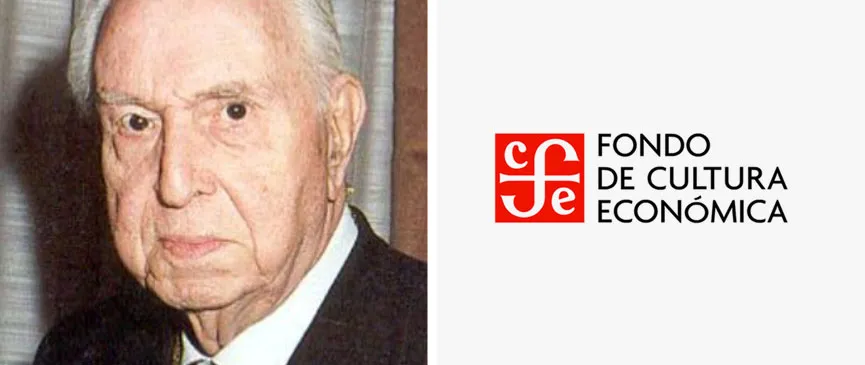Main content
Pedro Laín Entralgo and Fondo de Cultura Económica de México Prince of Asturias Award for Communication and Humanities 1989

Pedro Laín Entralgo (Urrea de Gaén, Teruel, 1908 - Madrid, España, 2001) studied in Soria, Teruel and Pamplona and at the universities of Zaragoza, Valencia and Madrid. Graduating in Chemistry, with an extraordinary prize, in 1927, and with a First in Medicine and Surgery, he expanded his studies at the psychiatric clinic of Vienna.
He worked as a doctor in the Valencia provincial asylum, and in 1939 began lecturing in the subject of Experimental Psychology at the University of Madrid, which he would teach until 1941. In 1940 he founded the journal "Escorial" with Ridruejo and Marichalar. Two years later he obtained the chair of History of Medicine at the University of Madrid, from which he would retire after thirty-five years intense work. In 1952 he was appointed as rector of the University of Madrid by the then Minister of Education, Joaquín Ruíz Giménez, but he resigned four years later as a consequence of the student disturbances which led to Tierno Galván, García Calvo and López Aranguren being removed from their chairs. In 1964 he entered the Royal Academy of History. In 1982 and 1987 he chaired the Royal Spanish Academy of the Spanish Language.
Founder and director of the Arnau de Vilanova Institute for History of Medicine, of the Higher Council for Scientific Research, and of the journal Archivo Iberoamericano de la Historia de la Medicina y Antropología Médica, he is an honourary professor of the National University of Santiago de Compostela, and doctor honoris causa of the universities of San Marcos (Lima), Toulouse (France), Zaragoza and Valencia. He belonged to the "Akademie der Wissenschften" (Heidelberg), "Academia Leopoldina" (Halle), "Académie Internacionale d´Histoire des Sciences", of the Hispanic Society of America and of the Royal Society of London.
Pedro Laín published numerous important works, among them the Historia universal de la Medicina and also Medicina e Historia (1941), La antropolgía de la obra de Fray Luis de Granada (1946), Grandes médicos (1961), Marañón y el enfermo (1962), Nuestro Cajal (1967), El médico y el enfermo (1969), Gregorio Marañón. Vida y obra (1969), La medicina actual (1973) or Historia de la Medicina (1978). Of his literary-historical works, one may mention Menéndez Pelayo (1944), España como problema (1949) or Descargo de conciencia (1975). He worked as a theatre critic for the Gaceta Ilustrada, which earned him the National Theatre Prize in the season 1970-71. he has also been awarded the Montaigne Prize in recognition of his work as a doctor and an essayist.
The Fondo de Cultura Económica (FCE) [Economic Culture Fund of Mexico] stands out for being a broad-based publishing house in which authors, both Spanish-speaking and those of other languages, present their ideas with absolute respect for thought and culture in the Ibero-American world, contributing decisively to mutual knowledge between nations and providing them with a solid cultural and scientific legacy and a forum free from ideology. The publishing house was founded in 1934 and is currently a decentralized agency of the federal government. In its beginnings, it featured the participation of prominent intellectuals concerned with spreading the culture of their country, including Daniel Cosío Villegas, Alfonso Reyes, Jesus Silva Herzog and Gonzalo Robles. It was also one of the publishing houses to publish the work of exiled Spanish artists and scholars who arrived in Mexico at that time.
The FCE was not conceived as a lucrative institution, but rather as a cultural promotion agency. Although the intention was initially to create a basic Economics library, new and varied collections emerged over time such as Politics and Law, Sociology, History and Anthropology, Philosophy, Science and Technology, Literature and Art, Language and Literary Studies, Psychology, Psychiatry and Psychoanalysis, Education and Pedagogy, Tezontle, American Library, Tierra Firme, Breviaries, Life and Thought in Mexico, Popular, Archives, Books for Children Books and Young People, Pre-Hispanic Codices and, recently, Fondo 2000 and Entre Voces.
The publishing house has nine branches located in Buenos Aires (Argentina), Bogota (Colombia), Sao Paulo (Brazil), Lima (Peru), Caracas (Venezuela), Guatemala, Santiago de Chile, San Diego (United States) and Madrid (Spain).
The FCE has been a forum for pluralistic debate, which has earned it the recognition of writers and publishers worldwide. The major Mexican writers have occupied an important place in the publications of the Fondo, but this has not meant less attention has been paid to intellectuals in the rest of the world.
For many generations of students and professionals, this publishing house has been an inexhaustible source of knowledge, as it has satisfied both their technical needs and intellectual concerns.
End of main content
